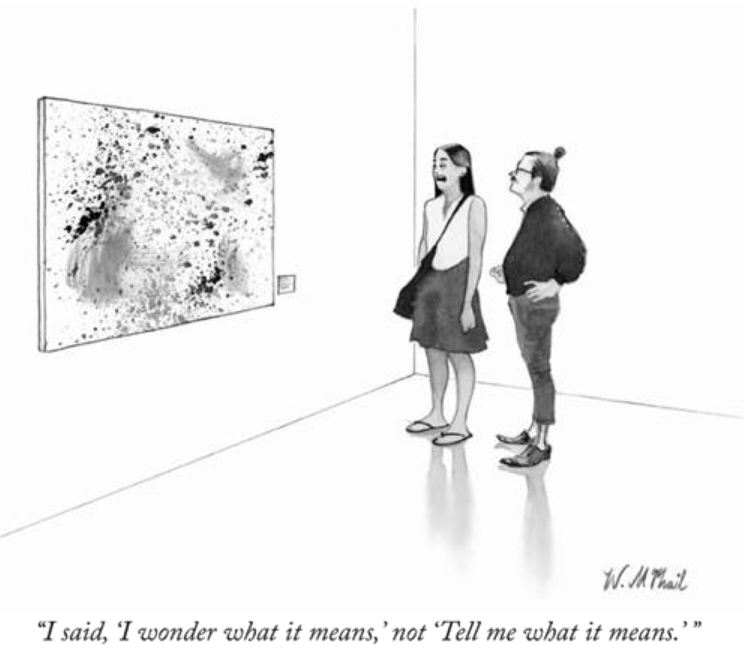
Logic and Conversation: Fall 2025
• Amsterdam • Master of Logic, University of Amsterdam
Traditionally, logic is concerned with the characterization of valid reasoning and argumentation, and therefore identifies the meaning of a sentence with its truth conditions. When analyzing the meaning of sentences in conversation, however, other notions become of interest as well. The focus of the course will be on inquisitive semantics, which enriches the traditional truth-conditional approach in ways that allow for a more comprehensive formal analysis of the meaning of sentences in linguistic interaction. The course introduces the basic inquisitive semantics framework, and discusses some current research on the semantics of questions. Specifically, this year, toward the end of the course, we will discuss some recent work on how questions are expressed and interpreted in sign languages.

Prerequisites
A good working knowledge of first-order logic is expected (see for instance the first three chapters of this book). It is also convenient to have some background in formal semantics (see for instance this book), though this is not strictly required. For students of the Master of Logic, this course is usually taken in the second year of the programme, after having completed Meaning, Reference and Modality and Structures for Semantics during the first year. Master and PhD students in Linguistics, AI, Cognitive Science and other programmes are also very welcome to take this course.
Textbook
The first part of the course uses a textbook. The book is open access, so everyone can download a pdf for free. If you prefer a hardcopy, you can order one at amazon or other online bookstores.
Grading and homework
The grade for this course is based on a final paper. There will also be homework exercises but these won’t be graded.
- A latex template for drawing inquisitive semantics diagrams can be downloaded here.
- Exercises from chapters 3 and 4 can be submitted until 19/11. Feedback will be provided by 26/11.
- Exercises from chapters 5 and 8 can be submitted until 26/11. Feedback will be provided by 3/12.
- Exercises from chapters 9 can be submitted until 3/12. Feedback will be provided by 10/12.
Please submit your exercises to Morgane by email (ziegler.morgane@gmail.com), with Floris in cc. You can submit your exercises in any readable format (typed and handwritten are both fine).
Office hours
There will be three office hours:
- 17/11 at 11.00-13.00
- 24/11 at 11.00-13.00
- 1/12 at 11.00-13.00
The office hours will be held in room F2.02 at Science Park 107.
Instructions for final paper
The final paper must written individually. Please discuss possible topics with me early on in the course. Topics should be determined by November 28 at the very latest and should be communicated to me by that date, either in class or by email. A preliminary version of the paper is to be presented during the last lecture on December 12, and the final version is due on December 20, 6pm. See Appendix B of the textbook and the inquisitive semantics website for pointers to some relevant literature, which may help in finding an interesting topic. You are strongly encouraged to discuss your projects with other students and give each other feedback.
Grading criteria for final paper
The grading criteria for the final paper are the same as for a master thesis, though of course here we do not expect as much as in the case of a thesis.
- Correctness All claims should be correct, precisely formulated and carefully argued for.
- Writing The paper should be well-structured; the writing should be clear and concise. Typically, papers are around 10 pages. There is no official upper or lower bound, but quality is preferred over quantity: a single idea or result that is clearly explained in 7 pages is better than a collection of multiple half-baked ideas discussed in 15 pages.
- Difficulty Both conceptual and technical difficulty are taken into account.
- Originality The paper should contain some new results. This can take many forms: establishing previously unknown properties of one of the logical systems discussed in class, or closely related ones; further enriching the theories discussed; testing the predictions of the theories; developing new applications; developing a theory of your own that solves some of the remaining challenges for the theories discussed.
Late policy
The deadline for the final paper is strict. Late submissions will in principle not be accepted.
Schedule
First week: Monday 11.00-13.00, Tuesday 11.00-13.00
After that: Wednesdays 11.00-13.00, Fridays 11.00-13.00
| # | Date | Room | Material | Content | Lecturer |
|---|---|---|---|---|---|
| The inquisitive semantics framework | |||||
| 1 | 3/11 | B0.208 | Book Ch.1 | Course overview and introduction (slides Floris | Floris |
| 2 | 4/11 | A1.22 | Book Ch.2 | Basic notions in inquisitive semantics (slides) | Floris |
| 3 | 12/11 | A1.22 | Book Ch.3 | Main operations on propositions in inquisitive semantics
(slides)
Exercises: 3.1, 3.2, 3.6 |
Floris |
| 4 | 14/11 | G0.23 | Book Ch.4 | Inquisitive semantics for a first-order logical language
(slides)
Exercises: 4.1 (items 1-3), 4.2, 4.3 |
Floris |
| 5 | 19/11 | A1.22 | Book Ch.5-6 |
Inquisitive semantics for declarative and interrogative sentences in English
(slides)
For the exactly one implication of alternative questions see Roelofsen 2017 and Westera 2019. Exercises: 5.3 |
Floris |
| 6 | 21/11 | L2.06 | Book Ch.8 |
Inquisitive semantics for attitude verbs
Exercises: 8.1, 8.4 |
Tomasz Klochowicz |
| 7 | 26/11 | B0.206 | Book Ch.9 |
Comparison with other frameworks
Exercises: 9.2, 9.3 |
Floris |
| Recent and ongoing work on questions in sign languages | |||||
| 8 | 28/11 | G0.18B | Klomp 2021 | Introduction to sign languages, Dutch Sign Language (NGT) in particular (documentary Doof Kind) | Tobias de Ronde |
| 9 | 3/12 | B0.206 | Oomen et al. 2025 | Polar questions in NGT: a production study (slides) | Floris |
| 10 | 5/12 | L2.06 | Polar questions in NGT: a corpus study and a comprehension study (slides) | Floris | |
| 11 | 10/12 | B0.206 | Guest lecture by Kate Davidson (Harvard Meaning and Modality Lab) | Kate Davidson | |
| 12 | 12/12 | L2.06 | Project presentations | Students | |